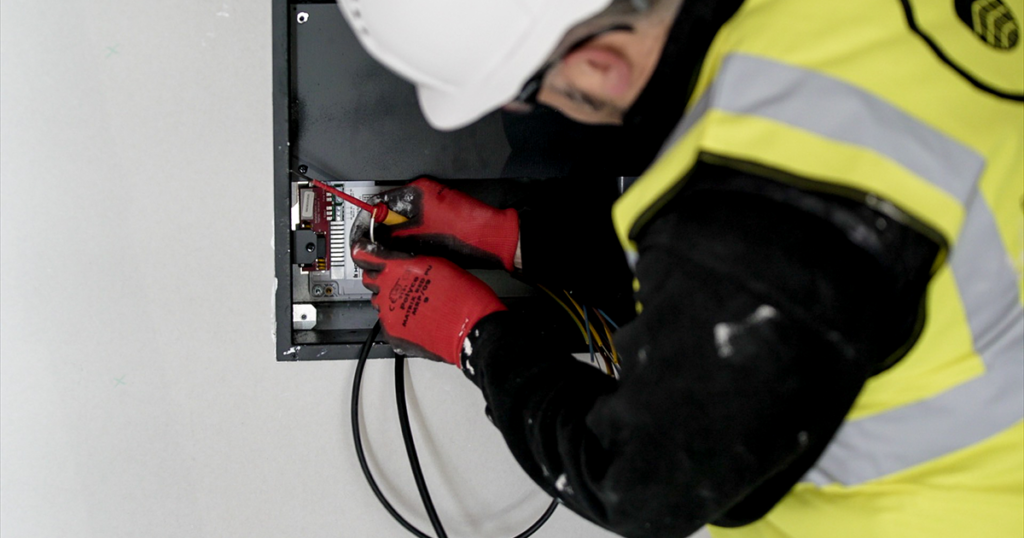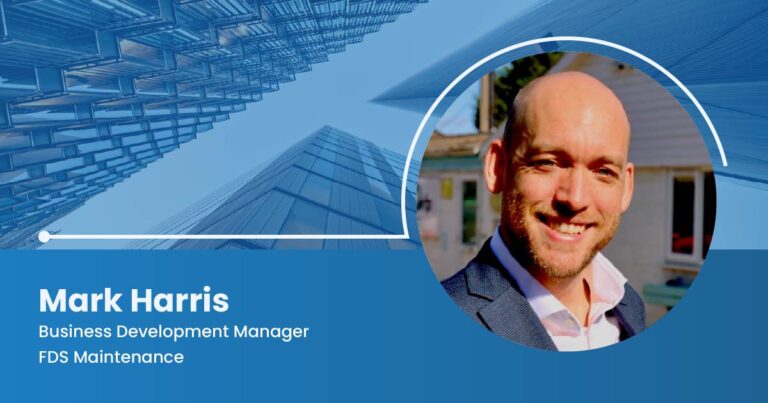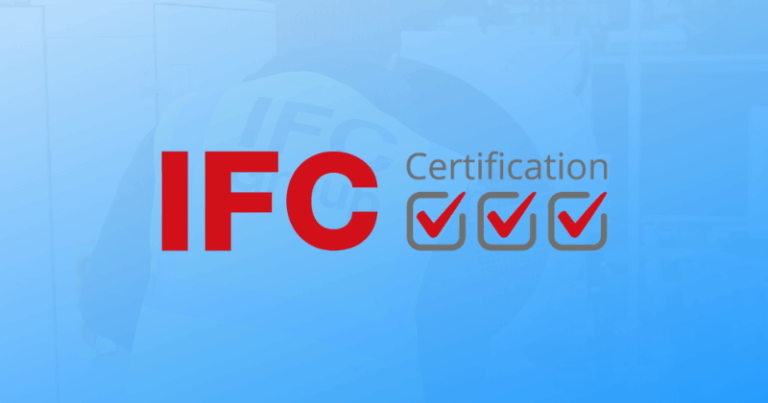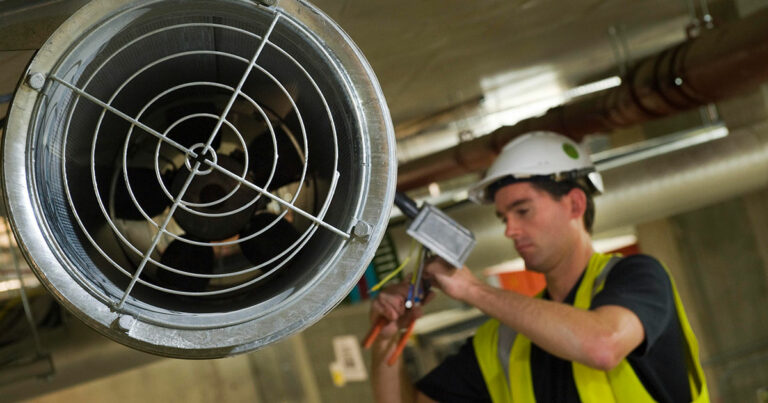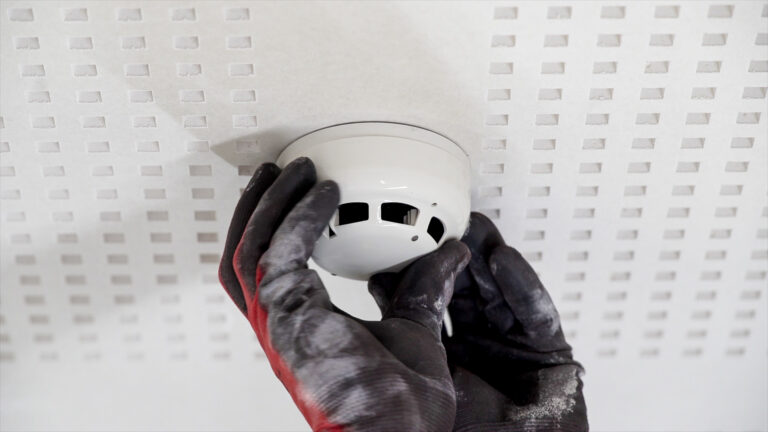It might seem convenient to have your fire alarm servicing company take care of your smoke ventilation system as well, one contractor handling it all. However, fire alarm systems and smoke vent (smoke control) systems are very different beasts.
As many building owners have learned, relying on a fire alarm firm to maintain smoke vents can be a costly oversight if they lack the specialised expertise. In this article, we explore the differences between these systems, why specialised competence matters, and how UK guidance and standards stress the importance of using qualified smoke vent specialists for smoke control maintenance.
Two Different Systems, Two Different Skill Sets
At first glance, fire alarms and smoke ventilation systems both seem to fall under “fire safety systems.” But their functions and technical makeup are worlds apart:
Fire Alarm Systems
These are designed to detect a fire and alert occupants. They consist of sensors (smoke/heat detectors), manual call points, control panels, and notification devices (sirens, strobes). Maintenance of fire alarms is primarily electrical: checking detector sensitivity, testing sounders, verifying the control panel, and maybe swapping out backup batteries. The toolkit is simple – smoke test aerosols, multimeters, etc. The knowledge base is about circuits, signals, and compliance with standards like BS 5839.
Smoke Ventilation Systems
These aim to remove smoke and heat from a building during a fire, keeping escape routes clear. They include mechanical components: AOVs (Automatic Opening Vents) on roofs or walls, powerful extract fans or jet fans, smoke dampers in ducts, and often their own control panel that interfaces with the fire alarm. Maintenance here is a mix of mechanical and electrical tasks: you need to ensure vents actually open fully (motors/actuators working and linkages not jammed), fans spin up and deliver proper airflow (which may involve an airflow test), dampers close and open on command, and that backup power (battery or generator) kicks in if mains fails. This often requires specialized tools like anemometers (for airflow) or pressure gauges, plus knowledge of aerodynamics and HVAC principles.
In short, the skills required to service each system are quite different. A qualified fire alarm engineer is an expert in detection and notification tech, but they typically are not trained in aerodynamics, fan mechanics, or smoke control strategy. Conversely, a smoke control specialist understands how smoke moves, how fans and vents interact, and the mechanical stresses on those systems. They also know the regulatory expectations for smoke control (which differ from fire alarms).
Industry experts warn that assuming a fire alarm company can automatically take care of smoke vents is risky:
“there are vast differences in the skill sets of the people who know such systems best.”
For example, a fire alarm technician might not know how to test a smoke extract fan’s performance or might overlook critical mechanical maintenance like lubricating actuators or checking shaft pressure. Simply put, being an expert in one does not make you an expert in the other.
Compliance Standards Demand Specialisation
The difference in expertise is also reflected in the standards and codes of practice for maintenance:
- Fire alarm maintenance in the UK follows BS 5839-1, which outlines regular testing (weekly user tests, quarterly/semiannual professional inspections) for alarm systems.
- Smoke ventilation maintenance is guided by standards like BS 7346-8 (Code of practice for maintenance of smoke control systems) and recommendations in fire safety codes such as BS 9999 and BS 9991. These documents prescribe specific schedules and competencies: for instance, daily or weekly visual checks by on-site staff, quarterly and annual servicing by specialists. They also stress that the servicing should be done by persons with adequate knowledge of smoke control systems.
Notably, BS 7346-8 and the Smoke Control Association guidance both advise using third-party certified specialists for smoke control maintenance. In the UK, the leading certification is the IFC SDI-19 scheme, which certifies companies for the installation and maintenance of smoke control systems.
If your maintenance provider has SDI-19 certification (or similar, such as BRE/LPCB qualifications), it’s a strong indication they truly understand smoke vents. A typical fire alarm company without such certification may lack the needed expertise.
In fact, official government guidance has explicitly pointed out that a:
“smoke control system should be maintained by a competent person who is familiar with the fire engineering performance specifications of that specific system.”
This statement, from the Department for Communities and Local Government, reinforces that competence is system-specific. It’s not enough to be an electrician or fire alarm tech; the person maintaining a smoke vent system must know the design intent of that exact system.
The Dangers of Using Unqualified Contractors
What can go wrong if an unqualified person services your smoke control system? Unfortunately, quite a lot:
- Incomplete testing: A fire alarm contractor might only test that the vents open when the alarm triggers (a basic functional test). They might not test things like fan belt tension, actual airflow rates, or whether vents fully open to the correct angle. They could sign off the system as “working” even if, in reality, the fan is delivering half the required extraction rate due to a fault.
- Misaligned cause and effect: Smoke control panels often have complex programming (which vents open for which detector, etc.). An untrained maintainer might not check the full cause-and-effect matrix. They could inadvertently leave the system in a compromised state after resetting something, if they don’t understand the logic.
- Missed maintenance tasks: There are mechanical maintenance tasks (e.g. cleaning smoke shaft vents, exercising backup motors, checking damper seals) that a general contractor might not realise need doing. Over time, neglecting these can lead to failures. For instance, if nobody ever checks the smoke shaft damper because the fire alarm guy “didn’t know there was one on the 10th floor,” that damper could be stuck closed. In an emergency, it won’t open and smoke won’t vent from that floor.
- False sense of security: Perhaps worst of all, using the wrong contractor can give the illusion of compliance. You think you’ve got maintenance covered because someone is issuing reports, but those reports might not catch critical issues. Meanwhile, you’re ticking the box for regulators that maintenance is done, only to find out during a real fire or a thorough audit that it was inadequate.
The Smoke Control Association warns that using personnel who aren’t qualified in smoke control can lead to “improper maintenance, undermining the system’s reliability when it’s needed most.” It’s truly a case of “you don’t know what you don’t know.” A contractor not versed in smoke control won’t intentionally do a bad job; they just won’t know that they missed something vital.
How to Ensure Competence in Smoke Vent Maintenance
Check qualifications and certifications
When hiring a maintenance provider for smoke control, ask specifically about their experience and certifications in that field. Do they have SDI-19 certification? Are their engineers trained on smoke ventilation systems (not just fire alarms)? Can they provide references or case studies of maintaining similar systems? A competent smoke vent specialist will be proud to share this information. If a contractor tries to assure you “it’s just another part of the fire system, we’ll look at it,” without evidence of specialist training, be cautious.
Look for a dedicated smoke control firm or a multi-discipline firm with separate teams
Some fire protection companies do have both fire alarm and smoke vent expertise under one roof – but typically they’ll have distinct teams for each. It’s perfectly fine if one company does both your alarm and vent, as long as they truly have the competency in each domain. Many building owners opt to use a dedicated smoke ventilation maintenance company (like FDS Maintenance, for example) alongside their fire alarm contractor, to ensure no corners are cut.
Third-party inspections
If you’re ever unsure about the quality of maintenance done, you can commission an independent inspection by a smoke control consultant or engineer. They can identify gaps or incorrect practices. This is a good idea especially if you’re switching from a generalist to a specialist – an audit might reveal issues to address from past neglect.
Keep an eye on maintenance reports
A thorough smoke vent maintenance report should detail checks that sound distinct from fire alarm tests. For instance, it should mention checking fan functional currents/airflow, cleaning AOV tracks, inspecting power changeover function, etc. If your maintenance reports for smoke vents look like a carbon copy of the fire alarm report (just listing detectors tested and panel checks), that’s a red flag that the provider might not have done much on the vent system.
As David Mowatt, chairman of the SCA, aptly put it:
“You wouldn’t allow anyone who wasn’t suitably qualified to conduct work on gas appliances in your home, so why would you not demand the same when it comes to … your smoke control system?”.
In other words, treat smoke vent maintenance with the same seriousness as any other specialised safety service – you need a qualified expert, not a general handyman.
Benefits of Using a Smoke Vent Specialist
When you engage a true smoke vent specialist, the benefits are manifold:
- Peace of mind: You can rest easier knowing the system has been gone over by someone who knows exactly what to look for. They will test things you might not even have known existed (like those interface relays or the fail-safe mode on the vents).
- Better system performance: Specialists often can tweak and optimize your system. For example, they may balance the fan speeds, adjust vent opening times, or fix pressure settings to ensure the system works more effectively. A generalist might not touch those settings at all (or worse, accidentally disturb them).
- Regulatory compliance: If you ever face scrutiny from fire officers or need to submit documentation (especially under new regulations for high-rises), having a maintenance certificate or report from a reputable smoke control firm is golden. It shows you took the competent route. Additionally, specialists will ensure your maintenance frequency meets the recommended guidelines (they’ll remind you of the quarterly and annual services, etc., in line with standards). This keeps you on track with legal obligations.
- Long-term cost savings: While specialists might charge more per visit than a basic fire alarm check, they likely save you money by preventing expensive failures. They can catch a fan that’s running abnormally and fix or replace it before it burns out completely during a fire. They can extend component life through proper adjustments and maintenance. Also, consider the potentially huge cost of a smoke ventilation failure during a fire – not just in lives (which is incalculable) but also in property damage and legal fallout. Proper maintenance is an investment in avoiding those catastrophic costs.
In conclusion, while it might be tempting to bundle your fire alarm and smoke vent servicing under one contract for convenience, make sure that contract either is with a specialised smoke control firm or that it includes a smoke control expert. Don’t hesitate to ask your provider tough questions about competence – your building’s safety depends on it.
When it comes to maintaining smoke ventilation systems, competence is non-negotiable. That’s why FDS Maintenance stands out. We are smoke vent specialists with industry-leading qualifications (including SDI-19 certification) and years of experience maintaining all types of smoke control systems. Don’t take chances with generalists.
Contact FDS Maintenance today and let our experts ensure your smoke ventilation system is serviced correctly, keeping your building safe and compliant.

